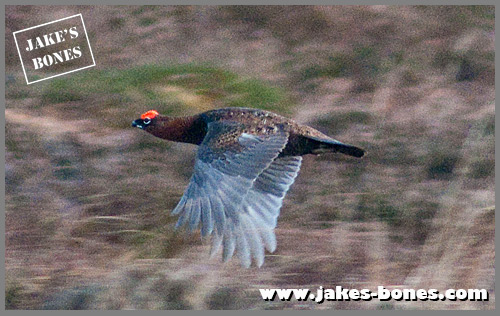First of all - a big thank you to everyone who came to hear my talk at Science and More in Gravesend last Tuesday night where I talked about my bone collection, how I started and where it has led me. It was brilliant to see so many people there and have so many interesting questions ! If you'd like to meet me I'm also speaking at the Wigtown Book Festival at the end of September, and the Stornoway Book festival at the end of October.
Anyway, back to this week. Mark Avery has written a book arguing there should be a law on grouse hunting, how other animals die as a result and how it destroys the moor that the grouse lived on.
Shooting game is a big part of the area where I live. Red grouse are game birds, hunted for sport, like pheasants. The best place to see them is on heathery moors - the same moors where I have caught a glimpse of the local hen harrier:
Shooting red grouse is big money. Shooters pay up to £3,000 for a day on the moors where 'beaters' scare the birds into the air. Once in the air, a line of shooters will try to shoot the birds. By the end of the season, more than half a million grouse will have been shot, and that's a lot of money into the pockets of landowners who tend to be very rich already. But it does create jobs for gamekeepers and beaters.
Hen harriers don't pay rent. In fact, they tend to prey thing as the shooters - grouse - but they don't pay £3,000 a day for it. And often gamekeepers are put under a lot of pressure to make sure there are enough grouse to be shot. They can legally shoot foxes, crows, weasels and stoats to do this. They are not allowed to kill birds of prey - but a lot of birds of prey seem to end up dead anyway.
Hen harriers go to moors during the breeding season. When they are not breeding, that like wide open places with low vegetation. In winter, they like to move farmland and costal marshes. There are only thought about 600 breeding pairs - that's not a lot.
This is from Monday's Herald newspaper:
Many birds of prey, including hawks, falcons, owls and other legally protected raptors, are killed and have their nests destroyed to remove any competition for the cowardly shooters. Raptor Persecution Scotland highlights the case of 22 raptors who were deliberately massacred in one of the worst wildlife-poisoning cases that Scotland has ever seen. Last year, William Dick from Dumfries was convicted for shooting a buzzard, stamping on her head and then repeatedly striking her with a rock. And earlier this year, George Mutch from Kildrummy was prosecuted for killing a Goshawk by hitting her over the head with a stick. And then there is the case of the "sporting manager" from one prominent estate who was fined £3,000 for keeping enough carbofuran, a banned pesticide, to kill every bird of prey in Scotland six times over.
I know quite a few gamekeepers, and they all seem fairly nice people. But if they lose their jobs, they often lose their house as well (the house is tied to the estate) and they often have to move hundreds of miles to get a new job. Even here, with fairly good estates, there are still problems. I blogged about a red kite was shot in my village a few years back, and a buzzard was found poisoned on the same moor last year.
A bit further way, in South Lanarkshire, a hen harrier was found shot on grouse land last April. The hen harrier, who was called Annie ,was satellite tagged when she was a chick, and when it stopped working, members from the RSPB set out to find her, and came across her dead.
There is a lot more crime occurs against birds of prey than is ever detected. Often it takes place in isolated places, known well by those who kill the birds of prey, who also dispose of the bodies well. They are easy to kill, and it's hard to spot when a bird of prey goes missing. Even when there is a massive poisoning - like the 16 red kites and six buzzards all poisoned last year - no-one is arrested. Those which are detected have very light sentences.
This can't go on. Even if you agree that animals should be bred just to be shot - like pheasants and grouse - then a tiny minority of people who hunt them shouldn't do so it at the expense of those native species which are struggling to make a comeback in the UK. Mark Avery has written more about that here. I hope you agree with him and me.
Enjoy this post ? Share it !

























0 comments :
Post a Comment